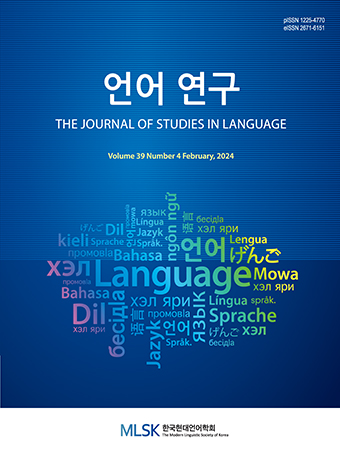Research Article
Abstract
References
Information
The study examines the linguistic resources used in the self-introduction produced by English learners at university level. According to Systemic Functional Linguistics (SFL), language is functional. Whether the learners are novices or proficient users, employ language as linguistic resources to make meanings. Moreover, social and cultural contexts play important roles when making choices among those linguistic resources. The study aims to determine what linguistic choices the English language learners make in order to make meanings in their writing. Following the SFL theoretical framework, the study looks at the English linguistic resources in terms of three metafunctions. For the ideational metafunction, the content words, prepositional phrases, and adverbial clauses are examined to see what the learners try to convey through the texts. For the interpersonal metafunction, verbial phrases are looked at to understand how the learners form the relationship with the reader through their linguistic choices. Furthermore, the thematic development of the texts is examined to see how the learners develop their introduction to perform the textual metafunction. The results of the study reveal that the English learners demonstrate a certain degree of limitations in utilizing the linguistic resources in terms of all three metafunctions.
- 이관규. 2018. 체계기능언어학의 특성과 텍스트 평가. 『문법 교육』 34, 195-222.
- 이승연. 2016. 사회과 텍스트 분석을 위한 비판적 담화 분석 방법의 이용: 체계기능언어학적 분석을 중심으로. 『시민교육연구』 48, 173-224.
- Achugar, M., M. J. Schleppegrell, and T. Oteíza. 2007. Engaging Teachers in Language Analysis: A Functional Linguistics Approach to Reflective Literacy. English Teaching: Practice and Critique 6.2, 8-24.
- Derewianka, B. and P. Jones. 2011. “From Traditional Grammar to Functional Grammar: Bridging the Divide.” In C. Coffin(ed.), Language support in EAL contexts. Why systemic functional linguistics? (Special Issue of NALDIC Quarterly). NALDIC, Reading, UK.
- Eggins, S. 2004. Introduction to Systemic Functional Linguistics. London: Continuum.
- Fang, Z. 2004. Scientific Literacy: A Systemic Functional Linguistics Perspective. Issues and Trends. 335-347. 10.1002/sce.20050
- Gebhard, M. 2010. Teacher Education in Changing Times: A Systemic Functional Linguistics (SFL) Perspective. TESOL Quarterly, 44.4, 797-803. 10.5054/tq.2010.237335
- Halliday, M. A. K. 1985. An Introduction to Functional Grammar (1st ed.). London: Edward Arnold.
- Halliday, M. A. K. 1989. Spoken and Written Language. Oxford, England: Oxford University Press.
- Halliday, M. A. K. 1994. An Introduction to Functional Grammar (2nd ed.). London: Edward Arnold.
- Halliday, M. A. K. 2004. An Introduction to Functional Grammar (3rd ed.). London: Edward Arnold.
- Halliday, M. A. K., and C. Matthiessen. 2014. Halliday’s Introduction to Functional Grammar (4th ed.). London: Routledge. 10.4324/9780203783771
- Kim, M. 2003. Coherence and Cohesion in the Narratives of Korean EFL Learners. Discourse and Cognition 10.3, 31-56.
- Martin, J. R. 2009. Genre and Language Learning. Linguistics and Education 20, 10-21. 10.1016/j.linged.2009.01.003
- Paltridge, B. and J. Burton. 2000. Making Sense of Discourse Analysis. Antipodean Educational Enterprises.
- Schleppegrell, M. J. 1998. Grammar as Resource: Writing a Description. Research on the Teaching of English. 32.3, 182-211.
- Schleppegrell, M. J. 2004. The Language of Schooling. Mahwah, N.J.: Erlbaum. 10.4324/9781410610317
- Thompson, G. 2014. Introducing Functional Grammar (3rd ed.). Oxon: Routledge. 10.4324/9780203785270
- Woo, S. J. 2018. A Corpus-based Analysis of Discourse Function of So in the Spoken Monologue of EFL Learners. Journal of Linguistic Studies. 23.3, 165-188. 10.21291/jkals.2018.23.3.9
- Publisher :The Modern Linguistic Society of Korea
- Publisher(Ko) :한국현대언어학회
- Journal Title :The Journal of Studies in Language
- Journal Title(Ko) :언어연구
- Volume : 36
- No :4
- Pages :469-486
- DOI :https://doi.org/10.18627/jslg.36.4.202102.469




 The Journal of Studies in Language
The Journal of Studies in Language






